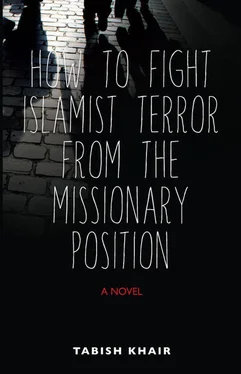There are other answers too.
But no, they are not answers. They are guesses. Who am I to answer for Karim Bhai? Who are you to demand answers from him?
Lena did not come to see Ravi off at Århus station. I doubt she texted him either.
Yesterday, as I was preparing the manuscript of this book for submission, I received, for the first time since his departure almost a month ago, an email from Ravi. He wrote with no reference to the past. He was in Mumbai. (No, he was in “Bombay,” as he actually wrote.) He had refused to move in with his parents; he was working for an NGO and writing as a freelancer. Ravi wrote that he was thinking of going back to journalism in India and uncertain whether he would even return to Denmark to defend his PhD thesis. Despite this old spark of Ravi’s fire, it was a subdued email. I heard a voice in it that I could hardly recognize, a resolute but chastened voice, the voice of someone willing to wait for things to happen.
Perhaps that is why I want to add this postscript. I wish to end my account of the infamous Islamic Axe Plot with one of my dreams. My MFA-girlfriend of yore probably had injunctions against ending a factual account with something as unreal as a dream. But a dream it has to be, I feel, for it was a strange dream, which returned me to the beginning of my story. And, more strangely, despite his flippancy and his skepticism, his claim that he never but once dreamed in Denmark, when I think of Ravi, I think of a dreamer. Someone who dreamed so deeply that he could not allow himself to recall his own dreams in the lurid light of ordinary day.
Unlike Ravi, I dream often and incoherently. I sometimes remember the shards and pieces of my dreams beyond those seconds of fleeting lucidity that divide sleep from wakefulness but dissolve in the glare of day. This dream too slipped from my memory, and returned only yesterday—triggered perhaps by Ravi’s email or by a glimpse of Karim. I need to talk about both.
I had the dream the night Ravi left; I’d accompanied him to Copenhagen. We had friends there, and it seemed a good idea to hit the town in order to see him off. As Ravi’s flight to Amsterdam left at six in the morning, we had less than three hours of sleep after our evening out with friends. Around four we took a taxi to the airport; we were too bleary-eyed to take the tube or the bus, as we had originally intended. We left as quietly as we could, for we did not want to wake up the hung-over friends at whose place we had slept. We did not say much in the taxi either, or at the airport. After checking in, Ravi gripped me by the elbow and took the escalator into the security clearance sections of Kastrup.
I hung around, walking about the orderly, compact airport, and then buying myself an elaborate and slow breakfast. Around nine, I caught a train back to Copenhagen’s central station and from there, a little later, to Århus. It was a bit after three when I reached Århus. It was a Sunday; the town was largely deserted. A bit of snow had fallen. The parked cars and cycles looked like they had been dusted with talcum powder. I walked down the pedestrian street, stopping to have a shawarma sandwich and a coke at a small Turkish eatery; a bitter wind was blowing from the sea, chilly with the ice of the North. I felt the kind of exhaustion, exacerbated by lack of rest and drinking the night before, which demands but does not permit sleep.
The early winter night had fallen, darkening the streets, when I finally reached the small, freshly painted two-room university apartment I had rented at the campus after moving out of Karim’s flat. I tried to read a book but could not concentrate. I opened a bottle of red wine but had little desire to drink. Around eight, without warning, sleep descended on me in a swarm of tiredness, with the sensation of a flock of crow-like birds, of a dark cloud falling from the sky, and I just managed to reach the bed before falling asleep. I do not recall the night. And when I woke up, a bit too early next morning, the dream too had misted in my memory. It came back only yesterday, with Ravi’s email and a disturbing glimpse of Karim: two living ghosts who continue to haunt me, it seems. I think I saw Karim Bhai’s taxi yesterday. I was returning from Ms. Marx’s place; her son is with her this week and I always feel odd sleeping over when he is home, though she has no objection to it. It was not too late, perhaps a bit after ten at night. The roads were crowded with young people—improbably dressed, especially the women in their stockings and tights, despite the cold—and I wanted to escape the forced clockwork bonhomie. Ravi and his desperation to live without being lost in habit was on my mind. I walked briskly to a taxi stand and spotted what I thought was Karim’s cab parked there. I dodged into another street. Urbanity provides us with so many ways to avoid people. Isn’t that what distinguishes it from traditional rural life, where the onus, perhaps because it was difficult and rare, was more on greeting people?
I walked half a kilometer to another stand, wondering why I had avoided Karim. Was I ashamed of facing him again? Perhaps. But I think it was more than that. I was ashamed of facing him and not being able to apologize fully. I felt we had done him an injury by preferring our suspicions—and I was more responsible for this than Ravi—to the daily evidence that he had provided of courtesy and decency within the limits of his humanity. But it wasn’t even that: not apology, which was neither demanded nor required, but honest conversation was impossible now.
How could I talk to him—I more than Ravi—again? It is, after all, Karim’s kind of religion that is used by fundamentalists of a different sort to condone the murder of innocent passers-by, the incitement of young men and women to commit acts whose brutal consequences they are hardly aware of at times. It is his kind of literal reading of the Quran that is used by Islamists to justify beheadings or the veiling of women, and, strangely, by those who hate Islam to dismiss an entire and complex tradition. It is the same Towhid—so precious to Karim—that jihadists use to espouse an intolerance so extreme, an order so narrow that only someone like Ravi, with his insistence on the anti-universalism of fascism, could distinguish it from fascism. How could I have spoken with a clean heart to Karim Bhai? Too much stood between him and me, and there was no Ravi—with his mocking belief in all that is best in us—to bridge the chasm now.
Guilt, you say? No, guilt is too glib a word, too simple—the sort of answer demanded of, and sometimes given by, novelists. Ravi might have felt some guilt for giving in to what, I suspect, he finally considered my fears for my own safety rather than his own opinion of Karim Bhai. But guilt is not what I felt, or not mainly. After all, I had not turned Karim over for interrogation by the Pakistani or Indian police, or sent him to Abu Ghraib! All I had condemned him to was relentless questioning, over cups of coffee perhaps, by orderly Danish investigators, no matter how prejudiced—questioning that, I am sure, would have come his way in any case, given his name and location. Think of the “Norway attacks” last year and the confidence of Danish journalists in attributing them to Islamists: what kind of people do you think would have been picked up for questioning if it had not been discovered that the perpetrator was a light-eyed, light-skinned Norwegian? No, guilt is not the word.
What I felt was the impossibility of conversation, as if I would have to shout across a Niagara of noise to Karim Bhai and what would come across, if anything, would not be the words I meant or the words he uttered but a sort of crude pantomime. It was not that we did not wish to talk. But the Niagara of suspicion and prejudice and brashness cascading around us made honest conversation impossible between the two of us.
Читать дальше












